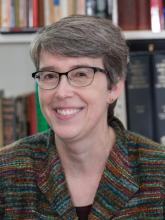Faculty Staff Institute Prompts HWW Partner to Rethink Processes, Partnerships
How can we make career diversity for graduate students in the arts and humanities an issue that effects substantive change on an institutional—even national—scale? For the past eight years, the Humanities Without Walls (HWW) consortium has engaged with this question, using it as a focal point when creating training and professional development programming for graduate students.

For Dr. Danielle Fosler-Lussier, this systematic change starts with a conversational shift: she uses narrative storytelling to amplify career diversity outcomes for graduate students. A faculty advisor in the School of Music at The Ohio State University, Fosler-Lussier has plenty of these stories. She eagerly shares one about a former student, Katelin Webster. Katelin is a first-generation college student, speaks German, and has a vested interest in community music making. In graduate school, she learned two dialects of Arabic and did field work in Germany, researching how Syrian refugees use music to integrate into society. Not interested in joining the professoriate, Katelin now has multiple job offers with organizations focused on refugee relief. Fosler-Lussier considers Katelin’s PhD trajectory to be a fantastic success, one that aligns with the outreach and engagement goal in the university’s strategic plan. And she’s telling anyone—faculty, staff, and administrators—who will listen.
“We need stories like this because we need to understand that these skills transfer. Faculty need to see concretely that this person hasn't left the field,” Fosler-Lussier said. “So I say, very specifically, they have entered the field, and they bring the knowledge we gave them [in their PhD programs] into that space.” As the Director of the Imagined Futures: Graduate Professional Development Initiative at Ohio State, Fosler-Lussier is part of a provost-level initiative utilizing arts and humanities strategies as an interdisciplinary approach to graduate career development. She believes that these conversations and the language we use (e.g., career options in the plural versus singular) are a way to normalize and build support for these initiatives across the entire campus. And Fosler-Lussier attributes her storytelling approach, in part, to her participation in the HWW Faculty Staff Institute (FSI) workshop held at Marquette University in the summer of 2023.
HWW piloted the first Faculty and Staff Institute during the 2019 career diversity workshop in Chicago, with a two-day session embedded in the workshop. Faculty and senior administrators from Chicago-based institutions were invited to share challenges, lessons, and best practices they learned in advocating for career diversity programming. Led by PI Antoinette Burton and Associate Director of Career Diversity Maggie Nettesheim Hoffman (an HWW 2017 Fellow), the HWW team developed the FSI model to immerse faculty and administrators in the national conversation about career diversity, share HWW methods and processes, and help them develop portable models for faculty development to their own campuses so that as broad a range of stakeholders as possible can help develop, socialize, and sustain models of career diversity best suited to their local campus cultures.
Fosler-Lussier acknowledges that there are challenges when attempting to transfer career diversity models from one institution’s idiosyncratic ecosystem to another. She mentioned a specific session from her FSI experience conducted by Megan Sielstra called, “What Are You Doing Here?”. In this exercise, Fosler-Lussier was reminded that folks in various roles across the university engage in career diversity work, and by proxy, the work is strengthened by these diverse perspectives. Equally important, she felt confident in her ability to reframe and integrate elements of an institution’s career diversity programming—such as Marquette University’s Trinity Fellows and M.A.P. programs— into her own work.
“It is starting to become clear how we could build our own ecosystem. Building sustainably requires X-ray vision into how the whole institution runs, and how the money flows, and how the processes work,” Fosler-Lussier observed. “The sustainability work is super important, and I'm still learning how to do it. But the FSI program pushed me in this direction, and it was a valuable push.”
Published on September 11, 2023